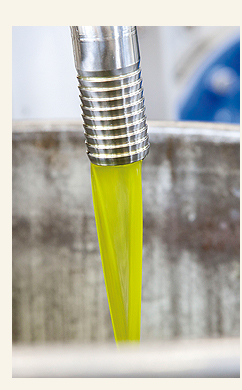
The five enemies of EVOO
A good way to understand how to keep an extra virgin olive oil fragrant and fresh is to learn about its five enemies:
1. Heat.
Exposure to heat spoils EVOO fast. Always keep EVOO in a cool place. The ideal temperature is between 50 and 60 Fahrenheit degrees (10-16 celsius degrees). In other words, high-quality EVOO needs to be treated like a precious red wine.
Can I cook with Extra Virgin Olive Oil?
2. Light.
Exposure to light spoils EVOO fast. Always keep EVOO in a dark place. Our bottles are black to ensure good protection from light (EVOO should never be kept in a clear bottle).
3. Oxygen.
Contact with oxygen spoils EVOO fast. Always keep EVOO in a tightly closed glass, ceramic or aluminum container.
4. Time.
Unlike wine, EVOO does not get better with time. EVOO is like a fruit juice: the fresher, the better. If kept under the right conditions, an EVOO maintains its "extra virgin" qualities for up to 18-24 months. Keep in mind that "best before date" is not an "expiration" date. In other words, EVOO does not become bad past its "best before" date; it is simply more likely to lose its "extra virgin" qualities, as it is less fresh. By the same token, if badly kept and handled (for instance, if kept in the heat or exposed to light) an EVOO may lose its qualities even before its "best before" date.
5. Misinformation/Fraud.
Perhaps the worst enemy of all is lack of knowledge about olive oil by many consumers, and misinformation and fraud by many producers and businesses. To give you an idea: it is said that more than 90% of the olive oils sold in stores as "extra virgin" are not extra virgin, but many people aren’t aware of this and are easily "fooled" into buying low quality (sometimes not even purely from olives) olive oil sold as "extra virgin". There are two simple tips to pick a good olive oil from a bad one. The first: choose a dark bottle (or ceramic/aluminum container) over a clear bottle. Second: look at price; real EVOO is expensive to produce, so be aware of "extra virgin" olive oils sold at very low price. You can also look for the DOP sign, which guarantees that the oil has been produced following strict guidelines.
To learn more about this, we suggest a fascinating book by acclaimed New Yorker writer Tom Mueller, "Extra Virginity: The Sublime and Scandalous World of Olive Oil". There is also a lot of good information on websites such as oliveoilsource.com and oliveoiltimes.com.












